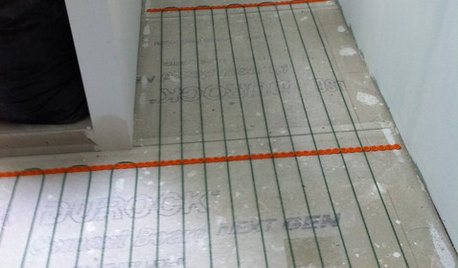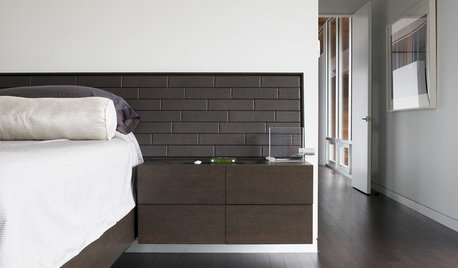Heated floor causing electrical shock when touching shower fixture
8 years ago
Featured Answer
Sort by:Oldest
Comments (48)
- 8 years agolast modified: 8 years ago
- 8 years ago
Related Discussions
Radiant Ceiling Heat - electric c.1967
Comments (77)We bought our house in 2015 and the prior owner was an electrician. The house was built in 1954 and we had the original furnace replaced 2 years ago. Prior to replacement, we were burning oil like mad! Our home is just under 1100 sq feet with 3 zones. The entire house is radiant heat in the ceiling, except the small kitchen which was an addition and has baseboard heating. When we replaced the furnace, we added digital thermostats with no issues in all 3 zones. We were advised to set the thermostat at the start of the season and then not touch it. Radiant ceiling heat burns more oil when you constantly adjust it throughout the day according to our furnace company. Last season we set it to 68 and left it all season Nov-March. This year we decided to try to bear it and have set it at 61. We filled the tank in September and I checked it this morning and we are at just above 1/2 tank! It’s 200 gallons. If we make no adjustments I think we will make it to end of February. Last year (2022) we filled Jan, Mar, May & Sept and we live on the Massachusetts coast. We are very happy with the radiant system. One thing I will add is we hung a ceiling light and had to buy a stud finder from Lowe’s so that we didn’t hit the radiant system. But we may have just had dumb luck!...See MoreMild electric shock in the shower
Comments (42)Did he check the main ground for the house? Do you have grounded outlets (3 prong)? Given the age of your house, perhaps not. I'm no expert but if plumbing inside the house is connected (bonded) to a 'ground' conductor in the wiring (either conduit or a ground wire), but at the end of the line it is not actually grounded due to a bad wire to the ground rod, or there is no ground rod, then any voltage getting into the 'ground' side of the electrical system can show up on a shower head, faucet etc. It may be something like bad electrical insulation in an appliance, or a failing capacitor in an electric or electronic device, virtually anywhere in the house. Again, though, I'm not an electrician. But yours might have to look deeper. And if he can't find any voltage on the shower head, maybe he needs to look in a different way - like running a wire somewhere else to use as a reference point to check voltage on the shower head. If the faucet and even the bathroom outlet all have the same voltage on them, a meter will show 0 volts potential. Have to find an actual real ground to measure against....See MorePainful shocks
Comments (11)The switchplates are plastic. Some have metal tags (denoting "fan" or "recessed"), but the zaps aren't confined to those. Our floors are mostly site-finished hardwoods, with tile in the bathrooms and laundry room. The master bath floor has electric radiant heat under travertine. Perhaps coincidentally, I got one of the worst shocks from the light switch there last night. Due in part to foot problems (& previously mentioned screws in both feet), I began wearing Crocs in the house about a month ago. I just read a number of articles about folks experiencing problems with static while wearing Crocs. I checked Snopes for a possible urban legend, but only found a reference to elevator incidents & Crocs on children (which were true.) Maybe there is something to it. Before calling the electrician, I think I'll try both increasing the humidity and wearing my old sneakers instead of the Crocs, to see if that makes a difference. I hate the idea of the Crocs being the culprit, especially if they're really being banned in some hospitals as I read tonight. I just bought some for one of my (grown) children to wear in the hospital. They seemed ideal because they're machine washable and provide more cushioning than most slippers. Anyway, thanks for helping to solve the puzzle....See MoreHeated floor causing shock from shower fixture
Comments (11)Yes I agree with you the mat must be leaking current in order to produce this effect. Unfortunately the cost of materials is so low compared to the cost of installation. I imagine if we go further with the troubleshooting we will reach a point where it's impossible to prove whether the mat is defective or if it was damaged from install, without ripping the whole thing out. The contractor was present when mat was installed and claims it was not damaged. The manufacturer is unlikely to warranty anything without proof of that which would presumably entail removing the floor. So that would mean we'd be paying a lot more for labor to have the issue diagnosed. I think we want the contractor to finish the kitchen work (install sink, DW hookup and backsplash) and then we'll have them cap off the system and abandon it. It's on its own breaker so it's not a risk right now. I will not expect to be charged for the install, I can return the thermostat and I'll be out $200 for the mat itself worst case scenario. If I need to get an electrician in there to separately confirm that it's most likely an install issue (ie if contractor charges me for install), I will. There were no extra leads, the mat came with the wires attached. We turned on the floor about 7 days after install when we moved back in, no one instructed us otherwise. I did see in the instructions online later to wait 28 days. I figured that is to allow mortar to set avoid cracking etc, but I didn't see that info until I watched the video after getting the shock. Lesson learned, if you want something like heated floor get an installer who has experience with the product....See More- 8 years ago
- 8 years agolast modified: 8 years ago
- 8 years agolast modified: 8 years ago
- 8 years ago
- 8 years ago
- 8 years ago
- 8 years ago
- 8 years ago
- 8 years ago
- 8 years agolast modified: 8 years ago
- 8 years ago
- 8 years ago
- 8 years ago
- 8 years ago
- 8 years ago
- 8 years agolast modified: 8 years ago
- 8 years ago
- 8 years agolast modified: 8 years ago
- 8 years ago
- 8 years ago
- 8 years ago
- 8 years ago
- 8 years ago
- 8 years ago
- 8 years ago
- 8 years agolast modified: 8 years ago
- 8 years ago
- 8 years ago
- 8 years ago
- 8 years ago
- 8 years ago
- 5 years ago
- 5 years agolast modified: 5 years ago
- 5 years ago
- 5 years ago
- 5 years ago
- 4 years ago
- 4 years agolast modified: 4 years ago
- 4 years ago
- 4 years ago
- 4 years ago
- 4 years ago
- last year
Related Stories

FLOORSWhat to Ask When Considering Heated Floors
These questions can help you decide if radiant floor heating is right for you — and what your options are
Full Story
CONTRACTOR TIPSBuilding Permits: When a Permit Is Required and When It's Not
In this article, the first in a series exploring permit processes and requirements, learn why and when you might need one
Full Story
BATHROOM DESIGNWarm Up Your Bathroom With Heated Floors
If your bathroom floor is leaving you cold, try warming up to an electric heating system
Full Story
REMODELING GUIDESFinishing Touches: Pro Tricks for Installing Fixtures in Your Tile
Cracked tile, broken drill bits and sloppy-looking fixture installations? Not when you follow these pro tips
Full Story
FLOORSIs Radiant Heating or Cooling Right for You?
Questions to ask before you go for one of these temperature systems in your floors or walls (yes, walls)
Full Story
FLOORSFloors Warm Up to Radiant Heat
Toasty toes and money saved are just two benefits of radiant heat under your concrete, wood or tile floors
Full Story
GREAT HOME PROJECTSHow to Add a Radiant Heat System
Enjoy comfy, consistent temperatures and maybe even energy savings with hydronic heating and cooling
Full Story
REMODELING GUIDESWhen to Use Engineered Wood Floors
See why an engineered wood floor could be your best choice (and no one will know but you)
Full Story
LAUNDRY ROOMSThe Cure for Houzz Envy: Laundry Room Touches Anyone Can Do
Make fluffing and folding more enjoyable by borrowing these ideas from beautifully designed laundry rooms
Full Story
BATHROOM DESIGN10 Living Room Touches to Bring to the Bath
Go ahead, borrow those bookshelves. Unexpected elements can boost interest and comfort in your bathroom
Full StorySponsored
Central Ohio's Trusted Home Remodeler Specializing in Kitchens & Baths





kudzu9